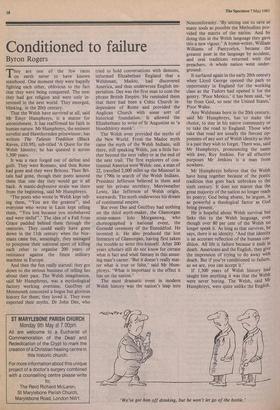Conditioned to failure
Byron Rogers
They are one of the few races on earth never to have known statehood. One moment they were happily fighting each other, oblivious to the fact that they were being conquered. The next they had got religion and were only in- terested in the next world. They emerged, blinking, in the 20th century.
That the Welsh have survived at all, said Mr Emyr Humphreys, is a matter for astonishment. It has reaffirmed his faith in human nature. Mr Humphreys, the eminent novelist and Hawthornden prizewinner, has written The Taliesin Tradition (Black Raven, £10.95), sub-titled 'A Quest for the Welsh Identity; he has quested it across 1,500 years.
It was a race forged out of defeat and guilt. They were Romans, and then Rome had gone and they were Britons. Then Bri- tain had gone, though their poets assured them that one day they would get it all back. A manic-depressive strain was there from the beginning, said Mr Humphreys.
`The poets who wrote in Welsh kept tell- ing them, "You are the greatest", and everyone who wrote in Latin kept telling them, "You lost because you misbehaved and were sinful".' The idea of a Fall from Grace padded behind them through the centuries. They could easily have gone down in the 1 1 th century when the Nor- mans came but, amazingly, they managed to postpone their national sport of killing each other to organise 200 years of resistance against the finest military machine in Europe.
And then the fun really started: they got down to the serious business of telling lies about their past. The Welsh imagination, said Mr Humphreys, was a mythological factory working overtime. Geoffrey of Monmouth concocted a bogus but glorious history for them; they loved it. They even exported their myths. Dr John Dee, who tried to hold conversations with demons, informed Elizabethan England that a Welshman, Madoc, had discovered America, and thus underwrote English im- perialism. Dee was the first man to coin the phrase British Empire. He reminded them that there had been a Celtic Church in- dependent of Rome and provided the Anglican Church with some sort of historical foundation. It allowed the Elizabethans to write of St Augustine as 'a bloodthirsty monk'.
The Welsh even provided the myths of the New World. From the Madoc myth came the myth of the Welsh Indians, still there, still speaking Welsh, just a little fur- ther beyond the next valley or at the end of the next trail. The first explorers of con- tinental America were Welsh: one, a man of 22, travelled 2,000 miles up the Missouri in the 1790s in search of the Welsh Indians. President Jefferson believed in them and sent his private secretary, Merriweather Lewis, like Jefferson of Welsh origin, westwards. The myth underwrote his dream of continental empire.
But even Dee and Geoffrey had nothing on the third myth-maker, the Glamorgan stone-mason lobo Morgannwg, who choreographed a national event, the Gorsedd ceremony of the Eisteddfod. He invented it. He also produced the lost literature of Glamorgan, having first taken the trouble to write this himself. After 200 years scholars still do not know for certain what is fact and what fantasy in this amaz- ing man's career. 'But it doesn't really mat- ter what is true or false,' said Mr Hum- phreys. 'What is important is the effect it has on the nation.'
The most dramatic event in modern Welsh history was the nation's leap into
Nonconformity. 'By setting out to save as many souls as possible the Methodists pro- vided the matrix of the nation. And by doing this in the Welsh language they gave this a new vigour.' A hymn-writer, William Williams of Pantycelyn, became the greatest poet in the language by accident, and oral traditions returned with the preachers. A whole nation went under- ground.
It surfaced again in the early 20th century when Lloyd George opened the path to opportunity in England for the working class as the Tudors had opened it for the gentry. 'Poor Mexico,' it has been said, 'so far from God, so near the United States,' Poor Wales.
Any Welshman born in the 20th century, said Mr Humphreys, has to make the choice, to stay in his native community or to take the road to England. Those who take that road are usually the fiercest op- ponents of any sort of Welsh identity as this is a past they wish to forget. There was, said Mr Humphreys, pronouncing the name with awe, Roy Jenkins. For all effective purposes Mr Jenkins is a man from nowhere.
Mr Humphreys believes that the Welsh have hung together because of the poetic tradition that goes back unbroken to the sixth century. It does not matter that the great majority of the nation no longer reads its poetry; God being absent, he argues, is as powerful a theological factor as God being present.
He is hopeful about Welsh survival but links this to the Welsh language, even though over 80 per cent of the Welsh no longer speak it. As long as that survives, he says, there is an identity. 'And that identity is an accurate reflection of the human con- dition. All life is failure because it ends in death. Americans and the English, they give the impression of trying to do away with death. But if you're conditioned to failure, as we are, you can accept it.'
If 1,500 years of Welsh history had taught him anything it was that the Welsh were never boring. The Welsh, said Mr Humphreys, were quite unlike the English.
'We've got him off drinking, but he won't let go of the bottle.'










































 Previous page
Previous page